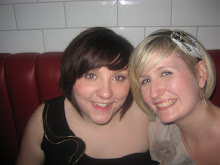During my very productive!!! dissertation research journey today! (now girls don't be too shocked by that :)) I came across a inspiring artist and designer, Stephanie Syjuco....who had some great word of wisdom for this years graduates at UC Berkeley Art Department. But i think what she has to say wouldn't go a miss with all us current undergraduates :D
"Now, perhaps more humorously, I offer the class of 2009 some tips that helped me immediately after graduating from a BFA program fourteen years ago and an MFA program four years ago. There is nothing super original about these tips, they just worked for me. You may have already discovered these things for yourself. Parents, you may not want to hear these, but I’m sorry.
–Dumpsterdive. It’s amazing what you don’t have to pay for, especially on a limited post-school budget. Just make sure you pull only the least expired food out to eat.
–Decide that sacrifice is not a sacrifice. If you are choosing to be an artist, don’t do it halfway. A painting teacher once said to me: “If you’re driving around in your car complaining that you don’t have enough money for oil paints, you’re nuts. You should sell your car and buy oil paints. Simple as that.” This isn’t about romance and living a quote-unquote “artist lifestyle.” This is about the necessity and the discipline it will take to focus as much time and energy into your work, that problematic and at times nebulous thing that you have been shaping and honing the past few years here. If you don’t take yourself seriously, no one else will.
–Don’t stop. The odds aren’t in your favor, there are so many distractions, so many things calling for your attention. But don’t stop making work.
–Compromise your living situation to afford a decent studio. Make peace with the idea that you will be crammed into a flat with more roommates than you can handle and that’s the tradeoff for paying for your own studio, your own bit of space to make work. See it as an investment, and not an option.
–Treat others in the artworld with respect, no matter what position you think they occupy. There’s a lovely saying that you should always be good to that gallery intern because they will one day be the museum director. This is not a joke.
–Find a job that you are either totally uninvested in emotionally or one that allows you access to ways of working on your own art while on company time. In other words, sometimes that café job isn’t the greatest career choice but it’s a means of making some money, getting free coffee, and allowing you more time in the studio. I spent nine years working at a museum because of the free woodshop and fabrication facilities, which I quietly took advantage of as often as possible, sneaking my own work onto company time.
–Honor your intangible labor in the studio, even when you or others don’t see apparent results.
–Don’t always know what’s fully going on in your work. Despite what your formal training is probably telling you, leave some “X” factors to both confound yourself and give the viewer something to grapple with.
–Never be more interesting than your own artwork. Period.
–Love others and take care of yourself. It’s so easy to be selfish for the sake of “the work.” Take the time to invest in your relationships because they will nurture you in more ways than you can imagine—lovers and partners, especially. Balance your love of solitariness with your love for them. There is nothing sadder than a lonely art star.
–Change the terms under which you exist. To pilfer a few economic recession terms currently in vogue: Dismantle. Restructure. Reorganize.
Finally, I think it’s funny that the term “practice” is used when referring to having an art “practice”. This whole thing is not practice. THIS. IS. FOR. REAL. Now go and live like it’s the only reality you’ve got."
Monday, 27 July 2009
Subscribe to:
Comments (Atom)



